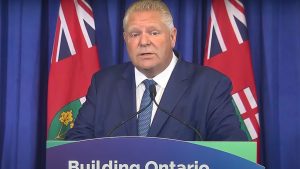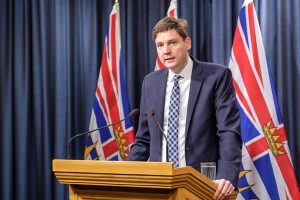With the Ontario election on the horizon, the Daily Commercial News wanted to reach out to industry leaders to get their “wishlist” of issues and items they feel should take centre stage for whomever forms the next government.
Here is part one of our series, which takes a look at housing and infrastructure.
Infrastructure has been a prominent issue in the 2022 provincial election campaign, with Highway 413 and housing topping the list of priorities for many Ontarians, including those in construction.
While PC Leader Doug Ford has made building highways like the 413 and the Bradford Bypass a key item on the campaign trail, the Liberal Party, the NDP and the Green Party have all said they will cancel it should they be elected.
“What RCCAO (Residential and Civil Construction Alliance of Ontario) would like to see from the party that wins the election is that continued focus on critical infrastructure and from our perspective that’s roads, bridges, water, wastewater and housing,” said executive director Nadia Todorova.
“We have to focus on investing in both transportation and transit, this kind of dichotomy that is present right now is you only have to invest in one or the other. That kind of thinking is outdated. Ontario needs both in the form of integrated transportation planning, which, from our perspective, is reflected in Highway 413.”
A recently released poll commissioned by the Ontario Provincial District Council of the Labourers’ International Union of North America from Sussex Strategy Group shows the Highway 413 project has 54 per cent support overall across Ontario. The figure grows to 57 per cent in the GTA, the region through which the corridor will be built.
The Ontario Sewer and Watermain Construction Association (OSWCA) has also expressed its support for highway infrastructure.
“We need the new veins and arteries for growth in this region,” said executive director Patrick McManus. “It’s going to create a lot of jobs and it’s going to support long-term growth. We think in many respects the election is a referendum on that issue of transportation construction. We think it’s absolutely critically important to see those projects move forward regardless of who is elected.”
Bryan Hocking, CEO of the Ontario Road Builders’ Association, said the association is in favour of any road and highway infrastructure. He realizes it is a contentious issue but thinks it will benefit Ontarians in the long run.
“We have to look to the future and just saying the 413 is unnecessary, those who are making the statement, are not looking 20 years down the road,” Hocking said. “This kind of highway doesn’t get built overnight. It will be sometime before the shovels go in the ground but it’s important to plan ahead.”
Planning for the immediate future is also top of mind for those looking to tackle the housing crisis.
The board of directors of the Residential Construction Council of Ontario (RESCON) are endorsing Ford and the Ontario PCs for 2022 re-election as they are “the only party addressing the housing crisis on a number of fronts such as the More Homes for Everyone Act and the More Homes, More Choice plan”.
“We are supportive of the current government,” said RESCON president Richard Lyall. “This government and Minister (of Municipal Affairs and Housing Steve) Clark have been on this issue from the get-go.
“They’ve hit the issue on a number of levels, much like they’ve done with skilled trades and apprenticeship. When you have systemic problems this big they take a long time to change…We’re pretty confident there will be more measures coming down the road.”
Todorova said another priority is for the government to focus on maintaining the current infrastructure they have in a state of good repair.
“Cities, especially those with large transit systems such as Toronto, they are experiencing significant budget shortfalls due to the low ridership as a result of the pandemic,” Todorova explained. “The next governing party must focus on ensuring that cities have that bridge funding required to get them through the transition period and prevent them from dipping into their capital budgets to address operating costs and to avoid deferring of critical and necessary state of good repair projects.
“Without that additional assistance from the other two levels of government cities will be forced to defer or cancel municipal infrastructure work because they can’t run a deficit in their budgets,” she added. “That will result in construction jobs being lost and essential and critical infrastructure falling into a state of disrepair which will result in higher repair costs down the line and it can also present dangers to public safety as well.”
Although Highway 413 is a significant issue for OSWCA, the more critical issue is providing assistance to municipalities to help them address their budgeting issues, McManus said.
Sectors like sewer and watermain are reliant on municipal infrastructure investments.
“These are companies that have built their businesses around municipal capital planning and annual forecasts, so having the funding for this work just disappear suddenly, it causes a real problem for maintaining our workforce at a time when we need consistent funding to maintain our workforce, to make sure we’re not losing people to other sectors,” said McManus.
Follow the author on Twitter @DCN_Angela.









Sussex Strategy conducted the survey and appears to have been paid by LUINA. Sussex Strategy Group lobbied the federal government on behalf of RCCAO. Nick Kouvalus, Advisor to Doug Ford, lobbied the City of Vaughan on Highway 413 on behalf of RCCAO. Then there’s LIUNA’s pension whose investments appears to benefit from the Ontario PC government’s infrastructure & planning decisions. Let’s get better usage of the 407 first, which means no new highway construction for the above as well as accompanying sprawl that follows. More credible sources w/ less vested interests please.